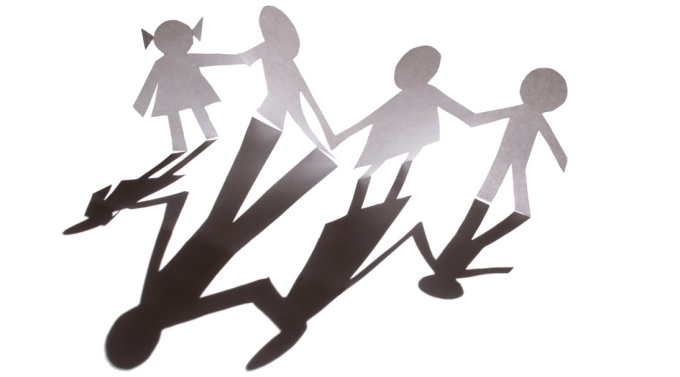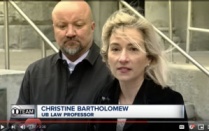
A new avenue in defense of children
Protections for at-risk children in New York would be strengthened, and guidelines for clergy members made clearer, under newly proposed legislation that grew in part from research by Associate Professor Christine Pedigo Bartholomew.
The legislation, the Child Abuse Reporting Expansion (CARE) Act, was announced Friday, March 15, by Assembly Member Monica Piga Wallace ’94. It adds members of the clergy to the long list of professionals who are mandated reporters, required by law to report to authorities any information about child abuse or maltreatment that they learn in the course of their work.
The CARE Act clarifies that clergy members must report such information. This reporting obligation would supersede ethical guidelines and state law to maintain confidentiality about conversations with communicants.
Bartholomew says Wallace developed the act – with the additional work of UB School of Law student Colleen Roberts, who is working in the Assembly member’s office – to shore up existing law.
“We realized there was a need to supplement the [recently passed] Child Victims Act,” Bartholomew says, “and that’s what the CARE Act intends to do.”

Prof. Bartholomew addresses the media.
Every state, and the District of Columbia, has laws on the books protecting the confidentiality of clergy-parishioner communications; New York’s was the first in the nation, dating to 1811.
Bartholomew’s research, which reviewed every judicial decision testing the limits of clergy privilege, was the first comprehensive analysis of such case law. In looking at over 700 cases in federal and state courts, she found that clergy members struggled with what to do when troubling information about child abuse came up in conversation with members of their congregations. “Increasingly,” she says, “clergy were recharacterizing confidential conversations to take them out of privilege, so they could testify about them.” For example, they might assert that the information arose in an offhand conversation and not the privilege-protected sanctity of confession or spiritual counseling.
The exception, she found, was that when clergy had information about another clergy member who was abusing a child, “they tended to try to push the privilege to make it much more expansive.”
The proposed legislation, Bartholomew says, makes it a clear-cut decision for clergy faced with such terrible knowledge: No matter the context in which the information was disclosed, they not only have the law’s permission to pass it on to authorities, but an obligation to do so.
“Courts have lost faith in the privilege,” Bartholomew argues in her published paper, “Exorcising the Clergy Privilege” (Virginia Law Review, October 2017). “More surprisingly, though, so have clergy. For decades, clergy have recast communications to ensure they fall outside testimonial protection – thus challenging how essential confidentiality is to spiritual relationships.”
“Not all confidences need shielding to foster and encourage spiritual relations,” Bartholomew concludes in the paper. “Nor does autonomy necessitate unqualified confidentiality. Using clergy’s own construction of the privilege provides a road map towards reconciling law and application.”
When she wrote the paper, Bartholomew says, “I had deep hopes that the abuse issues were a thing of the past. This research was intended to be historical.”
Wishful thinking. But Wallace’s proposed legislation, the professor says, would add another layer of protection for children at risk: “This would ensure that things don’t slip through the cracks in the Child Victims Act.”